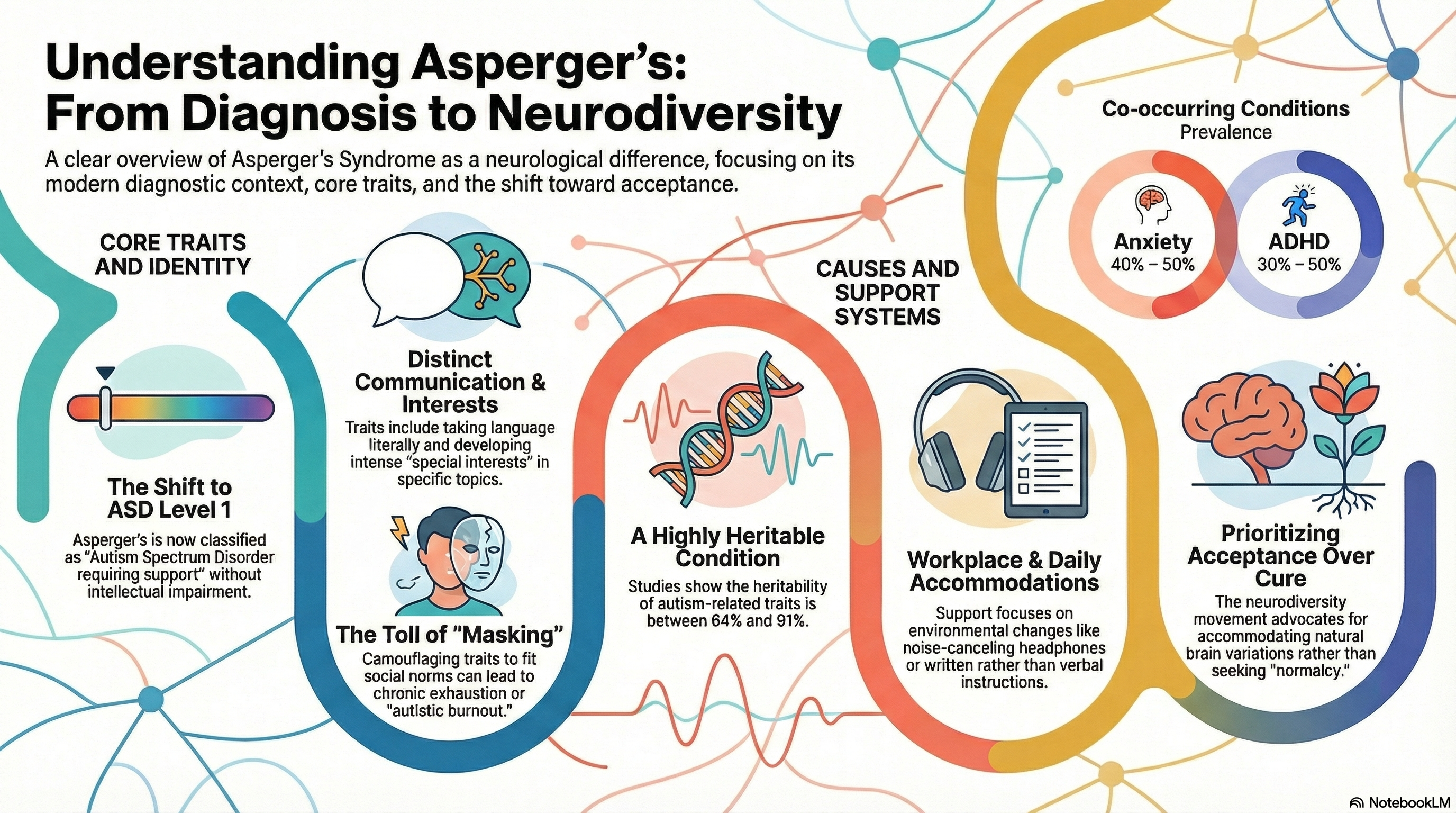What is Asperger’s Syndrome?
Asperger’s Syndrome is a neurodevelopmental condition that affects how people perceive the world and interact with others. Historically, it was considered a distinct diagnosis characterized by challenges in social interaction and communication, alongside restricted and repetitive patterns of behavior. Unlike "classic" autism, individuals with Asperger's typically have average to above-average intelligence and do not experience significant delays in language or cognitive development.
It is important to note that since 2013, Asperger’s Syndrome is no longer a standalone diagnosis in the DSM-5 (the manual used by doctors). It has been folded into the broader category of Autism Spectrum Disorder (ASD). Most individuals previously diagnosed with Asperger’s now meet the criteria for ASD Level 1, which is defined as "requiring support" but involving no intellectual or language impairment. Despite this change, many people still use the term "Asperger's" as a point of pride and self-identification.

Causes of Asperger’s Syndrome
The exact causes of Asperger’s are not fully understood, but current research indicates it is primarily neurobiological and genetic in origin. It is a difference in how the brain is "wired" rather than a disease.
-
Genetics: This is the most significant factor. Studies show that the heritability of autism-related traits is between 64% and 91%. It is polygenic, meaning hundreds of different genes likely contribute to the condition.
-
Neurobiology: Brain imaging shows differences in areas like the amygdala (processing emotions) and the prefrontal cortex (decision making and social behavior). There are also differences in "neural connectivity," where some areas of the brain may be over-connected while others are under-connected.
-
Environmental Factors: Advanced parental age and certain prenatal factors may increase risk, but they do not cause the condition on their own.
What does NOT cause it: Extensive research has proven that vaccines, "bad parenting," and psychological trauma do not cause Asperger’s or autism.
Symptoms of Asperger’s Syndrome
Symptoms vary widely, but they generally fall into several core areas. Many individuals learn to "mask" or camouflage these traits to fit into social settings, which can lead to exhaustion or "autistic burnout."
-
Social Interaction: Difficulty reading non-verbal cues like body language or tone of voice. Individuals may struggle with the "unwritten rules" of social life and may find it hard to maintain eye contact or take turns in conversation.
-
Communication Patterns: Speech may be very formal, precise, or pedantic. Many take language literally and struggle with sarcasm, metaphors, or idioms.
-
Restricted Interests: Developing "special interests"—intense, deep fascinations with specific topics (e.g., astronomy, train schedules, or historical eras).
-
Sensory Sensitivities: Being over-sensitive (hypersensitive) or under-sensitive (hyposensitive) to lights, sounds, textures, or smells.
-
Motor Skills: "Motor clumsiness" or poor coordination is a frequent feature, sometimes affecting handwriting or sports performance.
Diagnosis of Asperger’s Syndrome
Because there is no blood test for Asperger’s, diagnosis is based on behavioral observation and developmental history. Many people are not diagnosed until adulthood.
-
Current Standards: Doctors now use the DSM-5-TR criteria for Autism Spectrum Disorder. A diagnosis requires evidence of deficits in social communication and the presence of at least two types of restricted or repetitive behaviors.
-
Evaluation Process: This often involves clinical interviews, standardized tools like the ADOS-2, and IQ testing to confirm the absence of intellectual disability.
-
Gender and Racial Gaps: Historically, the male-to-female ratio was reported as 4:1, but we now know that women and girls often present differently and are better at "masking," leading to frequent under-diagnosis. Similarly, people of color and those from lower socioeconomic backgrounds are often diagnosed later in life.
Treatment of Asperger’s Syndrome
Asperger’s is a neurological difference, not a disease to be cured. Support is focused on helping the individual navigate a world that isn't always designed for their brain.
-
Therapies: * Cognitive Behavioral Therapy (CBT): Highly effective for managing co-occurring anxiety and depression.
-
Speech and Language Therapy: Focuses on "pragmatics"—the social use of language.
-
Occupational Therapy: Helps with sensory processing and fine motor skills.
-
-
Medication: While no medicine treats the core traits of Asperger's, medications can help with co-occurring conditions. Approximately 40–50% of autistic individuals experience anxiety, and 30–50% have ADHD. SSRIs or stimulants may be prescribed for these specific issues.
-
Support for Adults: This includes job coaching and workplace accommodations (such as noise-canceling headphones or written instead of verbal instructions).
Prevention of Asperger’s Syndrome
There is no way to "prevent" Asperger’s Syndrome, as it is a natural variation in human neurology. Instead, the focus is on preventing the negative outcomes that can occur when individuals are not supported.
-
Early Identification: Providing support early in life can prevent the low self-esteem, chronic anxiety, and social isolation that often occur when a child does not understand why they feel "different."
-
Managing Co-occurring Conditions: Proactive mental health care can prevent the high rates of depression and suicidality seen in the community.
-
Acceptance and Inclusion: Moving from "awareness" to "acceptance" in schools and workplaces helps prevent the burnout caused by masking.
-
The Neurodiversity Movement: This perspective argues that the goal should not be to make an autistic person appear "normal," but to change the environment to accommodate their needs.





